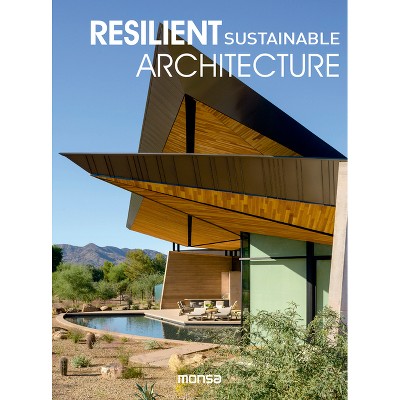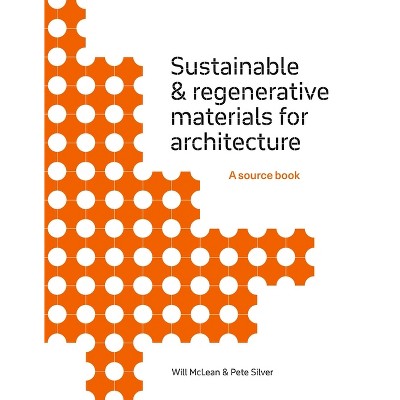Sponsored

Design and Architecture for Sustainable, Resilient, and User-Friendly Cities and Interiors - by Anna Visvizi & Asmaa Ibrahim & Sajid Khalifa
Pre-order
Sponsored
About this item
Highlights
- As cities evolve to meet the demands of the 21st century, the concept of "smart cities" has gained significant traction.
- About the Author: Anna Visvizi, Ph.D. (dr hab.)
- 216 Pages
- Architecture, Interior Design
- Series Name: Emerald Studies in Sustainable Architecture and Design
Description
About the Book
This edited book explores how architecture & design shape sustainable and user-friendly smart cities. Challenging tech-centric approaches, authors address the role of built environments in urban transformation. The collection features insights on contemporary design, product innovation, & case studies that redefine human-centered spaces.
Book Synopsis
As cities evolve to meet the demands of the 21st century, the concept of "smart cities" has gained significant traction. While much of the discourse focuses on digitalization and the role of information and communication technology (ICT), the fundamental impact of architecture and design in shaping sustainable and user-friendly environments is often overlooked. The built environment, which includes its structures, interiors, and public spaces, plays a crucial role in determining how livable and adaptable a city truly is.
Design and Architecture for Sustainable, Resilient, and User-Friendly Cities and Interiors inserts itself into this ongoing debate by shifting the focus away from technology as the primary driver of smart urban development. Instead, this volume explores how architecture and design serve as the foundation for creating cities that are not only smart but also livable, sustainable, and adaptable to future challenges. Divided into three parts, the authors of this collected edtion examine contemporary design and architectural principles, innovative approaches to sustainable product development, and case studies that highlight the intersection of design, user experience, and urban resilience. By centering infrastructure and spatial planning in discussions on smart cities, this edited collection offers a fresh and necessary perspective that redefines the role of design in urban evolution.
Bringing together scholars and practitioners from diverse disciplines, this volume is an essential resource for architects, urban planners, designers, and policymakers seeking to create cities that prioritize both technological advancement and human well-being. Addressing critical gaps in existing literature, this work provides a new framework for understanding how the built environment contributes to the future of sustainable urban living.
About the Author
Anna Visvizi, Ph.D. (dr hab.), economist and political scientist, Professor at the SGH Warsaw School of Economics, and Visiting Professor at Effat University, Saudi Arabia. Seasoned editor, researcher, recognized author, and accomplished project manager, Professor Visvizi has extensive experience in academia, think-tank and government sectors in Europe and the US, including the OECD. Professor Visvizi's expertise covers issues pertinent to the intersection of politics, economics and information and communication technology (ICT), which translates into her research and publications on applied aspects of ICT, in such domains as smart cities, knowledge & innovation management, as technology transfer, and governance. Professor Visvizi is the Editor-in-Chief of Transforming Government: People, Process and Policy (Emerald Publishing) as well as of Digital Policy, Regulation and Governance (Emerald Publishing).
Asmaa Ibrahim, Ph.D., Professor, currently serving also as the Dean of the College of Architecture & Design at Effat University, Saudi Arabia. She is originally a Professor of urban development at the Arch. Dep. Faculty of Engineering, Cairo Univ. with 18 years of academic and professional experience. She was the Hubert H. Humphrey Fellow in the SPURS program at MIT, USA (2018/2019). She was the main coordinator in the Double Master Program with Cottbus University in Germany, and Alex. University. She has fourteen years of experience in strategic regional and urban planning projects in UN HABITAT, GOPP, and GIZ with a focus on community development, gender programming and regeneration policies in historic districts, and new urban expansions. She has received extensive training at the World Resource Institute in Washington DC and Oxfam America in Boston in 2018/2019. She has more than 20 international publications in the field of sustainable urbanism.
Dr. Sajid Khalifa is an Assistant Professor of Industrial Design and Chair of the Design Department at Effat University in Jeddah, Saudi Arabia. His expertise spans design thinking, product development, innovation, creative processes, prototyping, and user experience. Dr. Khalifa's research explores the intersections of design, technology, and education, with recent works focusing on fabrication laboratories as innovative learning environments, the evolution of Japanese design in product development, and sustainable urban design futures. He has also examined the role of makerspaces and accreditation in shaping engineering and design education. At Effat University, he is deeply involved in advancing educational innovation through initiatives such as the FabLab, which reflects his commitment to hands-on, creative, and technology-driven approaches to learning.











